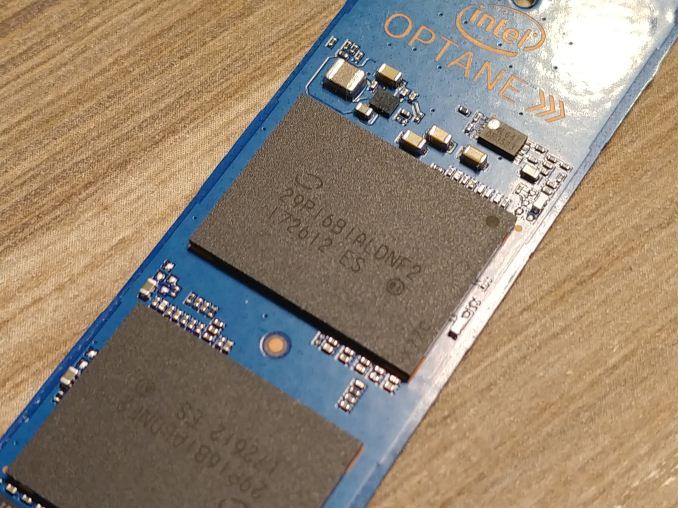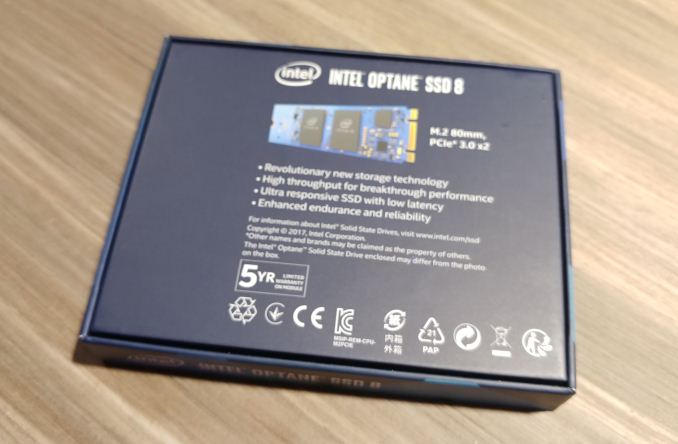Intel Previews Optane 800p 58GB And 118GB M.2 SSDs
by Billy Tallis on January 10, 2018 4:00 PM EST
LAS VEGAS, NV — Intel has previewed an upcoming expansion of their Optane family of storage products featuring 3D XPoint memory. The Optane SSD 800p is essentially a higher capacity version of the Optane Memory M.2 drives launched last year, featuring the same controller with a PCIe 3.0 x2 connection but with twice the write endurance rating and with improved power management.
The original 16GB and 32GB Optane Memory devices launched last year actually internally identified themselves as "Intel (R) Optane (TM) SSD 800p Series", but Intel chose to brand them differently in order to emphasize their intended role as cache devices. With usable capacities of 58GB and 118GB, the new Optane SSD 800p drives are more usable for primary storage. They will probably still be usable with Intel's Optane Memory caching software, but many users will prefer instead to treat the Optane SSD 800p as a standard NVMe SSD and directly install the operating system and applications to it.
Price and performance specifications are not being released yet. With four or eight 3D XPoint memory dies instead of one or two, the Optane SSD 800p may be able to deliver higher throughput than the Optane Memory, but the tiny controller and PCIe x2 uplink limit the potential performance gains.
The new Optane SSD 800p parts will be the first Optane products to include low-power idle states, making them much more suitable for notebook use than the Optane Memory M.2 modules that idle at about 1W. (The high-end Optane SSD 900p idles around 5W.)
The write endurance ratings for the Optane SSD 800p are still extremely conservative given the supposed advantages of 3D XPoint memory over NAND flash memory, and especially given that the new 800p SSDs are reserving more spare area than the Optane Memory modules. The 16 GB and 32 GB Optane Memory are both rated for a write endurance of 182.5 TB over five years, equivalent to 100 GB per day. The new 58 GB and 118 GB Optane SSD 800p drives are both rated for 200 GB per day over the same five year warranty period.
Intel roadmap leaks have previously revealed an M.2 Optane product with a PCIe x4 link. The Optane SSD 800p is not that product, and the impending release of the 800p suggests that the higher performance and higher capacity M.2 Optane product is still a few quarters away. The 800p should arrive in Q1 of 2018.
Source: Intel













26 Comments
View All Comments
Bullwinkle-J-Moose - Wednesday, January 10, 2018 - link
Intel needs to back the endurance claims with a warranty better than a Samsung 850 ProAt least match the 10 year warranty at the prices you will be asking
Jhlot - Wednesday, January 10, 2018 - link
Underwhelming. New products are hard but, I would have like to see Intel move faster on capacity and pricing.shabby - Wednesday, January 10, 2018 - link
It's almost like it's intentional, release low capacity drives at a price that the market can barely accept and hope for the best, its not like intel needs the money here.Reflex - Wednesday, January 10, 2018 - link
Can't wait to see second gen. 250/500GB options as a primary drive would be fantastic when prices get reasonable.tuxRoller - Wednesday, January 10, 2018 - link
I hope Intel tackles something like optane memory again, but this time have it attached to a ddr bus. Keep the kernel + userspace (base) with read + exec permissions (unless there's an update) and then dynamically load the remainder as needed. This would allow for more aggressive very low power states transitions and close to instant resume (with firmware help of a new sleep state beyond s5).Reflex - Wednesday, January 10, 2018 - link
I believe this was already in the plans, I know they intend modules for DDR slots, and I believe stateless memory is part of the long term goal.tuxRoller - Wednesday, January 10, 2018 - link
I'd heard about the ddr modules coming at some point (hopefully this year) but I wasn't aware that they were pursuing the computing model I had in mind. Thanks for the info.Amandtec - Thursday, January 11, 2018 - link
These products are currently the wrong use case because they are trying to sell something to enthusiasts who already have SSD or to OEM's who don't want to add $30 to their b.o.m.How about:
1) Integrate the 3d xpoint controller into the CPU to reduce costs.
2) Build into the cheaper intel processors ($100 and below) that unless they have 4-8GB of 3xpoint they don't run. This will add $5-$10 to the cost and make them seem super fast to the average use who just does email, Facebook and Office.
Amandtec - Thursday, January 11, 2018 - link
Or use 3dxpoint as cache on the hard drive device instead of dram (it 6x cheaper so include 6x as much - say 4GB at cost of $5 + controller.emvonline - Friday, January 12, 2018 - link
@amandtec: Ruin your microprocessor sales by forcing people to buy storage that no one wants at this time. Sorry... i suggest delivering an actually decent fast storage product. we will need to wait for Samsung to deliver that apparently. Intel can buy it from Samsung